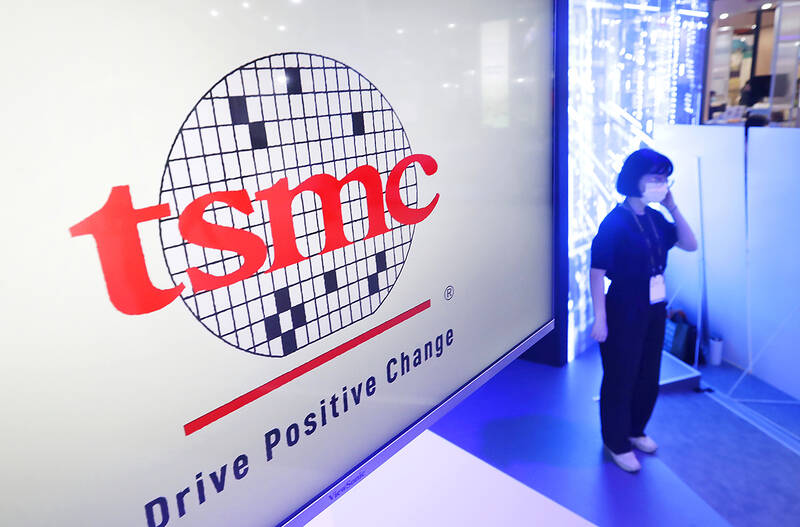Taiwan Semiconductor Manufacturing Co (TSMC, 台積電) and GlobalFoundries Inc have finished negotiating binding agreements for billions of dollars in grants and loans to support US factories, sources familiar with the matter said.
The deals, announced as tentative agreements earlier this year, come as US President Joe Biden’s administration races to get CHIPS and Science Act money out the door before the end of its term in January.
It is unclear when the agreements would officially be signed and the incentives unveiled, said the sources, who asked not to be identified because the conversations are private.

Photo: Chiang Ying-ying, AP
The award amounts are roughly in line with the preliminary agreements, the sources said.
TSMC’s package announced in April includes US$6.6 billion in grants and as much as US$5 billion in loans to support the construction of three semiconductor factories in Phoenix. GlobalFoundries’ agreement from February is for US$1.5 billion in grants and as much as US$1.6 billion in loans to support a new plant in New York state, as well as expansions of existing facilities there and in Vermont.
TSMC, GlobalFoundries and the US Department of Commerce declined to comment.
The CHIPS Act set aside US$39 billion in grants — plus billions more in loans and 25 percent tax credits — to revitalize US semiconductor manufacturing after decades of production shifting to Asia. It has generated 10 times that amount in promised private investment, including factories for advanced chips, older-generation semiconductors and supply chain components.
More than 20 companies are in line to win US government funding, and they have spent months undergoing a due diligence process after negotiating preliminary accords. There is also almost US$3 billion left to divvy up into preliminary agreements.
That means it is extremely likely that some of the funding would be finalized under the leadership of Donald Trump, who would take the White House in January.
Once contracts are signed, money would be disbursed in tranches based on project-specific milestones.
Industry officials are anxious to get things squared away as quickly as possible, to allow money to start flowing to projects that have hit those benchmarks as well as due to recent comments from Trump disparaging the program as “so bad.”
It is not yet clear what Republican control would bring. US House of Representatives Speaker Mike Johnson on Friday last week said that he wants to “streamline” the law, after floating — and then immediately walking back — the possibility of a wholesale repeal.

Semiconductor business between Taiwan and the US is a “win-win” model for both sides given the high level of complementarity, the government said yesterday responding to tariff threats from US President Donald Trump. Home to the world’s largest contract chipmaker, Taiwan Semiconductor Manufacturing Co (TSMC, 台積電), Taiwan is a key link in the global technology supply chain for companies such as Apple Inc and Nvidia Corp. Trump said on Monday he plans to impose tariffs on imported chips, pharmaceuticals and steel in an effort to get the producers to make them in the US. “Taiwan and the US semiconductor and other technology industries

SMALL AND EFFICIENT: The Chinese AI app’s initial success has spurred worries in the US that its tech giants’ massive AI spending needs re-evaluation, a market strategist said Chinese artificial intelligence (AI) start-up DeepSeek’s (深度求索) eponymous AI assistant rocketed to the top of Apple Inc’s iPhone download charts, stirring doubts in Silicon Valley about the strength of the US’ technological dominance. The app’s underlying AI model is widely seen as competitive with OpenAI and Meta Platforms Inc’s latest. Its claim that it cost much less to train and develop triggered share moves across Asia’s supply chain. Chinese tech firms linked to DeepSeek, such as Iflytek Co (科大訊飛), surged yesterday, while chipmaking tool makers like Advantest Corp slumped on the potential threat to demand for Nvidia Corp’s AI accelerators. US stock

The US Federal Reserve is expected to announce a pause in rate cuts on Wednesday, as policymakers look to continue tackling inflation under close and vocal scrutiny from US President Donald Trump. The Fed cut its key lending rate by a full percentage point in the final four months of last year and indicated it would move more cautiously going forward amid an uptick in inflation away from its long-term target of 2 percent. “I think they will do nothing, and I think they should do nothing,” Federal Reserve Bank of St Louis former president Jim Bullard said. “I think the

Cryptocurrencies gave a lukewarm reception to US President Donald Trump’s first policy moves on digital assets, notching small gains after he commissioned a report on regulation and a crypto reserve. Bitcoin has been broadly steady since Trump took office on Monday and was trading at about US$105,000 yesterday as some of the euphoria around a hoped-for revolution in cryptocurrency regulation ebbed. Smaller cryptocurrency ether has likewise had a fairly steady week, although was up 5 percent in the Asia day to US$3,420. Bitcoin had been one of the most spectacular “Trump trades” in financial markets, gaining 50 percent to break above US$100,000 and